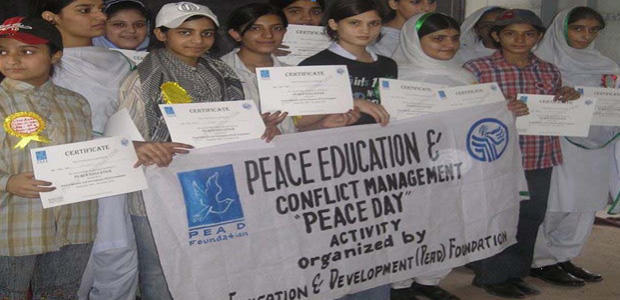In Khyber Pakhtunkhwa (KP) province of Pakistan, increased insurgent militancy has created a vicious cycle of violence, hostility and fear that has entrapped the population, particularly the youth. While communities struggle to cope with violence and the spread of extremism, the school system offers limited opportunities for students to build the skills needed to challenge extremist ideologies and develop constructive approaches to conflict resolution.

Reflecting USIP's commitment to empowering others with knowledge, skills and resources that promote the peaceful resolution of conflict, USIP's Grant Program provides support to Pakistani nonprofit organizations dedicated to helping youth find alternatives to violent extremism. For one example, the Peace Education and Development Foundation (PEAD) strengthened local capacities for peacebuilding by establishing a coalition of student and teacher peace advocates, developed the capabilities of students and teachers to engage in conflict prevention and management, and promoted dialogue on peaceful coexistence in local communities.
In the last two years, PEAD trained 540 secondary school students and 36 teachers in three districts of KP on the significance of peace and non-violent conflict resolution. The students formed Peace Groups which organized "Peace Days" for their local communities. The "Peace Days" expanded PEAD's reach to 18,000 students and garnered considerable local media coverage. Recognizing the important role that religious authority figures play in community life, the Peace Groups also worked with imams to introduce "Peace & Islam" themes into Friday sermons. In addition, PEAD was instrumental in the formation of Peace Network Pakistan (PNP), a network of 20 nongovernmental organizations (NGOs)promoting peace education across Pakistan.
To assess the efficacy of their training, PEAD carried out a detailed evaluation of the project, including a comparison of participating and non-participating schools. The study revealed a striking improvement in the trained students' attitudes, with a 20 percent increase among those who think that violence can be prevented through dialogue. The study also showed similar improvements in those who think it is possible to co-exist with people from diverse backgrounds and that they have an individual ability and responsibility to foster peace.
As PEAD educates students and teachers on the value of nonviolent conflict resolution and equips youth with alternative methods to resolve disputes, communities in PK can be changed in ways that will over the long-term establish a more just, inclusive, and peaceful Pakistan that is less likely to engender violence and foment international conflict.



